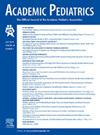变性和对性别有疑问的青少年中的网络欺凌受害者。
IF 2.8
3区 医学
Q1 PEDIATRICS
引用次数: 0
摘要
目的:在美国不同国家的早期青少年样本中确定跨性别或性别质疑身份与网络欺凌受害者之间的关系。方法:我们分析了青少年大脑认知发展(ABCD)研究的横断面数据(N=9,989, 3年级,2019-2021,11-14岁,48.8%女性,47.6%种族/少数民族)。采用Logistic回归分析来估计跨性别或性别质疑身份与终生网络欺凌受害之间的关系,并对社会人口混杂因素进行调整。结果:在9989名青少年的样本中(1.0%的跨性别者,1.1%的性别质疑者),跨性别者(OR 2.24, 95% CI 1.22-4.10)和性别质疑者(OR 1.91, 95% CI 1.05-3.47)与他们的顺性别同龄人相比,青少年遭受网络欺凌的几率更大。没有证据表明跨性别认同与出生性别的网络欺凌受害之间存在显著的关联。结论:跨性别和性别质疑的早期青少年遭受网络欺凌的比例高于他们的顺性别同龄人。未来研究可进一步探讨性别少数青少年网络欺凌的风险及保护因素。本文章由计算机程序翻译,如有差异,请以英文原文为准。
Cyberbullying Victimization Among Transgender and Gender-Questioning Early Adolescents
Objective
To determine the association between transgender or gender-questioning identity and cyberbullying victimization in a diverse national sample of early adolescents in the United States.
Methods
We analyzed cross-sectional data from the Adolescent Brain Cognitive Development Study (year 3, 2019–2021, 11–14 years old, 48.8% female, 47.6% racial and ethnic minority). Logistic regression analyses were conducted to estimate the associations between transgender or gender-questioning identity and lifetime cyberbullying victimization, adjusting for sociodemographic confounders.
Results
In a sample of 9989 adolescents (1.0% transgender, 1.1% gender-questioning), both transgender (odds ratio [OR] 2.24, 95% confidence interval [CI] 1.22–4.10) and gender-questioning (OR 1.91, 95% CI 1.05–3.47) adolescents had greater odds of cyberbullying victimization compared to their cisgender peers. There was no evidence of significant effect modification of the association between transgender identity and cyberbullying victimization by sex assigned at birth.
Conclusions
Transgender and gender-questioning early adolescents experience higher rates of cyberbullying victimization than their cisgender peers. Future research could investigate the risk and protective factors for cyberbullying in gender minority adolescents.
求助全文
通过发布文献求助,成功后即可免费获取论文全文。
去求助
来源期刊

Academic Pediatrics
PEDIATRICS-
CiteScore
4.60
自引率
12.90%
发文量
300
审稿时长
60 days
期刊介绍:
Academic Pediatrics, the official journal of the Academic Pediatric Association, is a peer-reviewed publication whose purpose is to strengthen the research and educational base of academic general pediatrics. The journal provides leadership in pediatric education, research, patient care and advocacy. Content areas include pediatric education, emergency medicine, injury, abuse, behavioral pediatrics, holistic medicine, child health services and health policy,and the environment. The journal provides an active forum for the presentation of pediatric educational research in diverse settings, involving medical students, residents, fellows, and practicing professionals. The journal also emphasizes important research relating to the quality of child health care, health care policy, and the organization of child health services. It also includes systematic reviews of primary care interventions and important methodologic papers to aid research in child health and education.
 求助内容:
求助内容: 应助结果提醒方式:
应助结果提醒方式:


